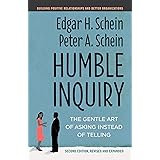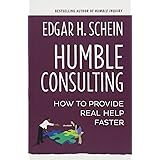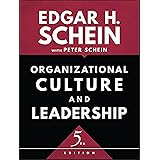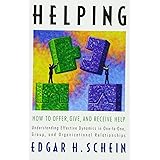
Download the free Kindle app and start reading Kindle books instantly on your smartphone, tablet or computer – no Kindle device required.
Read instantly on your browser with Kindle for Web.
Using your mobile phone camera, scan the code below and download the Kindle app.

OK
Humble Leadership: The Power of Relationships, Openness, and Trust Paperback – Aug. 14 2018
There is a newer edition of this item:
The more traditional forms of leadership that are based on static hierarchies and professional distance between leaders and followers are growing increasingly outdated and ineffective. As organizations face more complex interdependent tasks, leadership must become more personal in order to insure open trusting communication that will make more collaborative problem solving and innovation possible. Without open and trusting communications throughout organizations, they will continue to face the productivity and quality problems that result from reward systems that emphasize individual competition and "climbing the corporate ladder". Authors Edgar Schein and Peter Schein recognize this reality and call for a reimagined form of leadership that coincides with emerging trends of relationship building, complex group work, diverse workforces, and cultures in which everyone feels psychologically safe. Humble Leadership calls for "here and now" humility based on a deeper understanding of the constantly evolving complexities of interpersonal, group and intergroup relationships that require shifting our focus towards the process of group dynamics and collaboration. Humble Leadership at all levels and in all working groups will be the key to achieving the creativity, adaptiveness, and agility that organizations will need to survive and grow.
- Print length184 pages
- LanguageEnglish
- PublisherBerrett-Koehler Publishers
- Publication dateAug. 14 2018
- Dimensions14.1 x 1.24 x 21.62 cm
- ISBN-101523095385
- ISBN-13978-1523095384
Customers who bought this item also bought
Product description
Review
“This is the key book for the new age of human organizations. It ought to be compulsory reading for anyone who is given charge of any operation.”
—Charles Handy, author of The Second Curve
“The future will reward humility and punish arrogance. Ed and Peter Schein show us both the power and the strength of humble leadership. This bookis an antidote to arrogance and a practical guide to making the future.”
—Bob Johansen, Distinguished Fellow, Institute for the Future, and author of The New Leadership Literacies
“This book outlines the pathway to a culture of cooperation and trust and the leadership needed to create this. If you take it seriously, Humble Leadership is the only book on management that you will ever need.”
—Peter Block, author of Stewardship and Flawless Consulting and coauthor of An Other Kingdom
“Humility may be the modern leader’s most important attribute. In a complex, dynamic world, humility is simply realism. This powerful and thoroughly engaging book delivers the wisdom of Edgar Schein’s half century of research and practice dedicated to helping organizations and those who manage them. Its authors—a pioneering organizational scholar and his son—embody humility as they describe its power in transforming organizations. Compelling case studies clarify the humble leadership approach and make it actionable.”
—Amy C. Edmondson, Novartis Professor of Leadership and Management, Harvard Business School
"Effective leadership is all about building trust and relationships. With Humble Leadership, Ed and Peter help us to actually get there by understanding relationships on a much more granular and tangible level."
—Severin Schwan, CEO Roche Group
“In an era of national cynicism and dismay, this call for empathy, trust, and collaboration is a timely breath of fresh air with relevance for leaders at all levels.”
—Lucian Leape, Adjunct Professor of Health Policy (retired), Harvard School of Public Health
“In focusing on ‘levels of relationships,’ the book explains how…emerging leaders can succeed by interacting with peers and those reporting to them in ways that are in stark contrast to the coercive and ‘bad behaviors’ we are currently hearing about. Ed and Peter Schein offer them an alternative and far superior approach to leadership—one based on cooperative relationships with others that emphasize trust and respect and, in turn, lead to stronger and more effective organizations.”
—Robert A. Cooke, author of Human Synergistics’ Organizational Culture Inventory
“For those in the health-care world who face the challenge of leading organizations with layers of administrative and clinical complexity, this book offers a path to success. Humble leadership, as the authors remind us, though, is no mere philosophy. It is a result of disciplined attention to structure, culture, and relationships. The Scheins offer a persuasive road map to achieve this understanding and true effectiveness in institutional settings.”
—Paul F. Levy, former CEO, Beth Israel Deaconess Medical Center, and author of Goal Play!
“Edgar and Peter Schein’s new book, Humble Leadership, builds on decades of study focused on organizational culture and leadership. They articulate the criticality of leadership in successful organizations and the strong correlation of relationships that go beyond the transactional with successful leaders and successful organizations. This is a must read for reflective leaders at all levels seeking to enhance their effectiveness and execution in pursuit of their organizational mission and vision.”
—Gary S. Kaplan MD, Chairman and CEO, Virginia Mason Health System, Chair Lucian Leape Institute
“Edgar and Peter Schein have built on a series of previous informative books such as Helping and Humble Inquiry with their new book, Humble Leadership. The insights into the importance of relationships and building an atmosphere of openness and trust are helpful to all leaders. I believe it is particularly informative for those in health care, dealing with the marked technical and operational complexities.”
—Lane F. Donnelly, MD, Chief Quality Officer, Lucile Packard Children’s Hospital Stanford, and Professor, Stanford University School of Medicine
"Humble Leadership introduces a new model for leadership that supports effectiveness in a rapidly changing world where leaders and their followers are being driven by deeply entrenched cultural norms. The timeless insights about relationships, personizing, group process, and culture will help every leader.”
—Tim Kuppler, Director of Culture and Organization Development, Human Synergistics, and cofounder of CultureUniversity.com
"The book offers a deeply human approach to leadership that is attuned to the staggering complexity, rapid change, and uncertainty facing anyone aiming to make a difference in today’s world. Written as a joint project by Ed Schein and his son Peter, Humble Leadership is a way of being a leader that does not rely on transactional power, but on the relational power that comes from trust, openness and collaboration. Illustrated with rich case examples from the Schein’s extensive practices as organizational consultants and exercises to develop leadership capacities of one’s own, the book has the ring of authenticity that comes from the hearts of people who have walked the walk."
—Maureen O’Hara, Founding Fellow, International Futures Forum; Professor, National University; and coauthor, with Graham Leicester, of Dancing at the Edge
"Leadership is a socio-technical process, but most leaders have only been prepared for the technical dimension; despite their best intentions, their performance and that of their teams and organizations falls short. Humble Leadership aims squarely at this problem – how to attend to the social dimension - and hits a bull’s-eye. This compact and lively volume shows why organizations cannot thrive on impersonal interactions, but instead require higher-order relationships that engender trust and honest conversation. Presenting fundamental principles and many instructive examples, it also provides very practical guidance about how to establish such relationships. Readers from my industry, healthcare, will find described in this book exactly the leadership practices that are needed backstage to achieve patient-centered or relationship-centered care on the front lines. This is going to be a very impactful book!"
—Anthony L. Suchman, MD, MA, Senior Consultant, Relationship Centered Health Care
About the Author
Peter A. Schein is the cofounder and COO of the Organizational Culture and Leadership Institute.
Product details
- Publisher : Berrett-Koehler Publishers (Aug. 14 2018)
- Language : English
- Paperback : 184 pages
- ISBN-10 : 1523095385
- ISBN-13 : 978-1523095384
- Item weight : 230 g
- Dimensions : 14.1 x 1.24 x 21.62 cm
- Best Sellers Rank: #257,217 in Books (See Top 100 in Books)
- #3,033 in Leadership
- #3,275 in Management (Books)
- #3,324 in Business Leadership (Books)
- Customer Reviews:
About the author

Ed Schein was Professor Emeritus of the Massachusetts Institute of Technology (MIT) Sloan School of Management. He passed away in late January 2023, just shy of his 95th birthday. Ed was educated at the University of Chicago, Stanford University, and Harvard University, where he received his Ph.D. in Social Psychology. He worked at the Walter Reed Institute of Research for four years and then joined MIT, where he taught until 2005.
He published many books -- _Organizational Psychology_, 3d Ed. (1980), _Process Consultation Revisited_ (1999), _Career Anchors_, 4th ed. With John Van Maanen, (2013), _Career Anchors Reimagined_, 5th ed. With John Van Maanen and Peter A. Schein, (2023), _Organizational Culture and Leadership_, 5th Edition with Peter A. Schein (2017), _The Corporate Culture Survival Guide_, 3d Edition with Peter A. Schein, (2019), a cultural analysis of Singapore's economic miracle (_Strategic Pragmatism_, 1996), and Digital Equipment Corp.'s rise and fall (_DEC is Dead; Long Live DEC_, 2003).
In 2009 he published _Helping_, a book on the general theory and practice of giving and receiving help followed in 2013 by _Humble Inquiry_ which explores why helping is so difficult in western culture, and which won the 2013 business book of the year award from the Dept. of Leadership of San Diego University. In Spring 2016, Ed released _Humble Consulting_ which revises the whole model of how to consult and coach.
Ed's last posthumous release, co-authored with his son Peter A. Schein, is _Humble Leadership 2nd Edition_ (2023) which proposes a new way of thinking about leadership based on relationships, openness and trust, challenging traditional notions of hierarchy, "professional distance" and transactional leadership. The first edition of _Humble Leadership_ (2018) was honored with a Nautilus Book Awards Silver Medal.
Ed and Peter continued to consult, until the day Ed died, with various local and international organizations on a variety of organizational culture and career development issues, with special emphasis on safety and quality in health care, the nuclear energy industry, and the US Forest Service. An important focus of this consulting is to focus on the interaction of occupational/organizational subcultures and how they interact with career anchors to determine the effectiveness and safety of organizations.
Ed Schein is the 2009 recipient of the Distinguished Scholar-Practitioner Award of the Academy of Management, the 2012 recipient of the Life Time Achievement Award from the International Leadership Association, the 2015 Lifetime Achievement Award in Organization Development from the International OD Network, and has an Honorary Doctorate from the IEDC Bled School of Management in Slovenia.
Customer reviews
Top reviews from other countries
- Location 250: In climbing the corporate ladder, top executives were rewarded for competitive individualism. Too many are unwilling or unable to change their behavior and build reward structures that strengthen new cultures of teamwork, engagement and innovation.
- Location 600: Learning together is one of the best ways of getting to know each other. Why? Because in that context, people can give each other feedback and suggestions on how work can be done better.
“The traditional 20th-century culture of management can be described as a transactional set of relationships among designated roles that unwittingly creates conditions of low openness and low trust and can therefore make truly effective leadership difficult.”
Humble Leadership is about how you can change that. It’s about how you can lead where you are in a way that makes a difference.
I purchased this book because I’d read many books by Edgar Schein over the years. They were all insightful and prodded my thinking. They made me a better leader. When I combined that experience with the purpose of the book, it seemed like it would be a winner.
The book got off to a slow start. The “examples” the authors used seemed abstract, almost made up. The first two chapters worried me. I thought this might be the first Edgar Schein book I’d read that was awful. I shouldn’t have worried.
Beginning with Chapter 3, the pace of the book picks up and it reads more easily. The examples are concrete and identifiable. I tell you this because you may be tempted to close the book in the first two chapters. Don’t do that.
You may also be tempted to skip the first two chapters since you know they’re the dull parts. Don’t do that either. The first two chapters give you basic concepts that will illuminate the examples in the rest of the book. There are two important concepts.
Personization
Many styles of leadership treat people as if they were interchangeable parts. Companies commonly try to shape people to fit the job or role. Most don't try to discover what people are particularly good at and how they can make their best contribution.
Personization is the process of turning roles and jobs into people. People are messier than roles and jobs. They show up with emotions and interests. They get passionate about stuff that seems to have no bearing on what their job is.
I wondered about the need for a new word, but I got it after reading several examples. “Personization” may be a made-up, special word, but it’s easier than any alternative I could come up with. By the end of the book, I was not only comfortable with it, I used it.
Levels of Relationship
Here’s how the authors describe the four levels of relationship.
“Level -1: Total and personal domination and coercion.
Level 1: Transactional role and rule-based supervision, service, and most forms of “professional” helping relationships.
Level 2: Personal cooperative, trusting relationships as in friendships and in effective teams.
Level 3: Emotionally-intimate, total mutual commitments.”
We already use these (without the labels) in our personal life. The relationship that we have with our physicians and with people we see every day but don’t know well is much like level 1. Most leadership is transactional. Our friends are at level 2. The people we hold close, like family and our most intimate friends, are at level 3. The Scheins’ say because we use this framework in our everyday life, it’s easy to translate it to our working life. That was true for me as I worked through the book and tried to apply the framework in a business context.
There are two reasons I like this book.
Doable Transformation
Many of the books on new ways to lead, such as Humanocracy, are “boil the ocean” books. They call for a major, permanent overhaul of whole organizations. While that might be great, it’s not likely to happen. My life experience tells me that we’re talking about generational change. The most powerful force for change will not be some theory. It will be the retirement ceremony.
Humble Leadership Allows for Hierarchy
Most other “reformist” thinking on leadership in organizations says to rid of hierarchy. That won’t happen. Human beings are hard-wired to be sensitive to hierarchy. Humble leadership works in a hierarchy. You can practice humble leadership and not be seen as some wild-eyed reformer.
I've observed and studied effective leaders for decades. Most of the do what the Scheins suggest.
In A Nutshell
If you want to become the best leader you can be, you should read Humble Leadership. You’ll be introduced to a system that will seem familiar because you already use it in your personal life. The humble leadership idea doesn’t require wholesale transformation of entire organizations. It doesn't ask you to defy human nature by eliminating hierarchy. You can do it all without assuming the role or wild-eyed reformer.
The End of Vertical Hierarchy
Humble leadership offers an antidote to arrogant leadership, but it’s also the antithesis of the seemingly more attractive leader-as-hero. Whether it’s the sole, revered visionary or simple old-fashioned hierarchy they make clear why it’s not going to help us in the future.
Old forms of leadership may have worked when technology was nascent and leaders held power over vital information, but our current age is characterized by rapid-paced, technological change and “messy complex problems.” No one person has all the information needed to make good, timely decisions.
The speed of change, complexity of tasks and constant disruption requires organizations to be nimble and ready to pivot. To do that employees have to be as networked and facile as the technology they rely on. To achieve that level of connectedness, Edgar and Peter Schein provide a guide to Humble Leadership.
Different Leader-Relationship Types
To understand the concept, it’s important to know the authors’ ranking of work relationships. They’ve defined four levels while highlighting what’s needed for effective workplace communication.
Level -1 (Negative 1) - Fear: Totally impersonal relationships characterized by domination and coercion. An example would be illegal immigrants working in a sweatshop being threatened with deportation if they complain about working conditions.
Level 1 - Distance: Transactional relationships characterized as role and rule-based supervision and service. An example would be dealing with doctors and lawyers where there’s an expected level of social and professional distance.
Level 2 - Openness: Relationships that acknowledge the whole person characterized by a deeper level of trust and openness. An example would be how we deal with friends and family. (Ideal)
Level 3 - Intimacy: Close relationships characterized by love and emotional attachment. Examples could range from extremely close friendships to office romance and nepotism.
Transactional Organizational Culture
What the authors see a lot of in corporate America is Level 1 relationships. These transactional relationships go hand-in-hand with formal hierarchy. In organizations characterized by Level 1 culture, leadership is solely responsible for the direction of the company, communication is top-down and employees are expected to execute a prescribed game plan.
In these types of organizations, the authors report mistrust of leadership and a higher potential for employee burnout. They point to recent scandals at Volkswagen and Wells Fargo as extreme examples of what can go wrong in Level 1 cultures. Leadership dictated unrealistic goals, turned a deaf ear to employee warnings and nearly brought down 2 venerable institutions.
Impact of Level 2 Relationships
The authors propose that leaders develop Level 2 relationships with subordinates and colleagues in order to build environments that ensure success given today’s workplace challenges. This does not equate to “soft” or nice leadership. It means forming relationships with others in order to increase the level of trust and reduce the amount of fear. The more fear in an organization, the less likely employees are to share vital information. The less sharing of information, the more likely leadership is to make faulty or late decisions.
The assumption is that “leadership exists in all corners and levels of all organizations” and since we rely on each other to make the right decisions, quickly, it is critical to support and encourage this interchange. When leaders initiate the kinds of conversations that allow all levels to see each other as whole people, employees feel safe to contribute. The result is groups and work teams solving problems together. Without these active networks, organizations don’t have the information to thrive in the marketplace.
A Whole New Word
Putting a finer point on what it takes to build Level 2 relationships, the authors coined the term - “personization.” They define it as, “the process of mutually building a working relationship with a fellow employee, teammate, boss, subordinate or colleague based on trying to see that person as a whole, not just the role that he or she may occupy at the moment.” (They considered the existing word, “personalization” but decided against it since it’s come to mean “customization.”)
Again, it’s not about becoming “besties” with your work mates. You don’t even have to like everyone you work with. It’s about providing “psychological safety” such that you can get work done faster and better.
Case Studies:
The stories of Humble Leadership in action come from a number of unlikely sources:
In Singapore, an authoritarian dictatorship, “early leaders...and their colleagues took to building a modern city-state out of an economically declining colony.” The authors describe the methods and journey of these leaders and maintain, “Humble Leadership contributed to Singapore’s economic success!”
Virginia Mason’s medical center transitioned to a Level 2 culture after coalescing around a shared vision of the future. It’s a well-documented Lean transformation story, but the authors illuminate the role of Humble Leadership in their success.
The U.S. Military story is a great example since it’s a place “in which Level 2 relationships seem most out of place.” This is the account of how a nuclear submarine with a demoralized culture became a “high-morale, effective, proud Level 2 organization” through Humble Leadership.
These are great examples in part because they emerge from unexpected sources. They showcase the power and possibility of “personization.” Other stories range from efforts at auto manufacturer Saab, early days at Sun Microsystems, to the nonprofit wildlife protection efforts of The Massachusetts Audubon Society. All detailing the lessons from and the positive impact of cooperative leadership.
From Transactional to Personal
Since Humble Leadership is key to thriving in an age of accelerating systemic change, it’s important to understand how to make it happen. In the face of competitiveness and one-upmanship how does one pivot to a culture of empowerment and interdependence? On a simple level, it involves talking to people with a “spirit of inquiry.”
Countermeasures range on a continuum from making eye contact to taking employees to lunch. The point is to convey to one another, “I see you.” They make the point that this is different from “I like you” or inviting people over for dinner. While we are often eager to “power-through” agendas, it’s more effective to build time into the start of meetings for simple exchange especially when bringing new members into the group. Just enough to see each other as “whole people.”
Getting Proficient at Humble Leadership
In the last chapter, the authors outline a self-directed program for becoming a Level 2 Leader. It’s a 3-part curriculum described down to task-level detail.
Read Books: Deepen your understanding of Humble Leadership by reading a curated list of books.
The authors describe 10 books including what each adds to the conversation
Establish Current State: Do some homework to understand the current state of your work relationships and build a plan to move them more fully into Level 2.
The authors provide tools and guidance on how to embrace the right mindset, how to uncover your own biases and realize your blind spots
Practice: Try out new behaviours by conducting “Empathy Walks” and learn by doing your own fieldwork.
The authors provide sample questions to pose to others and step-by-step instructions on how to conduct your own experiential learning and benefit from Level 2 relationships.
Edgar Schein’s Impact in the World
This is a deceptively simple concept and Humble Leadership rounds out the trilogy on the theme he started with his remarkable book Humble Inquiry. It’s impossible to overstate the contributions of Edgar Schein to the field of organizational development, and how great it is that his son has become a dynamic co-author. Books with “humble,” “gentle” and “relationship” in the title can seem out of place in a world bent on disrupting industries and capturing market share but thanks to the Scheins they are inextricably interlinked.
Reading these cases and learning about the people and organizations touched by Edgar Schein and his son Peter leaves the reader with profound appreciation for the impact this nonagenarian, and now his son, have had in the world. We spend the a huge chunk of our waking hours at our jobs and thanks to Edgar and Peter Schein there’s a path to turning our organizations into arenas where we can flourish and do gratifying work. We should all endeavor to have such positive impact on the world.










